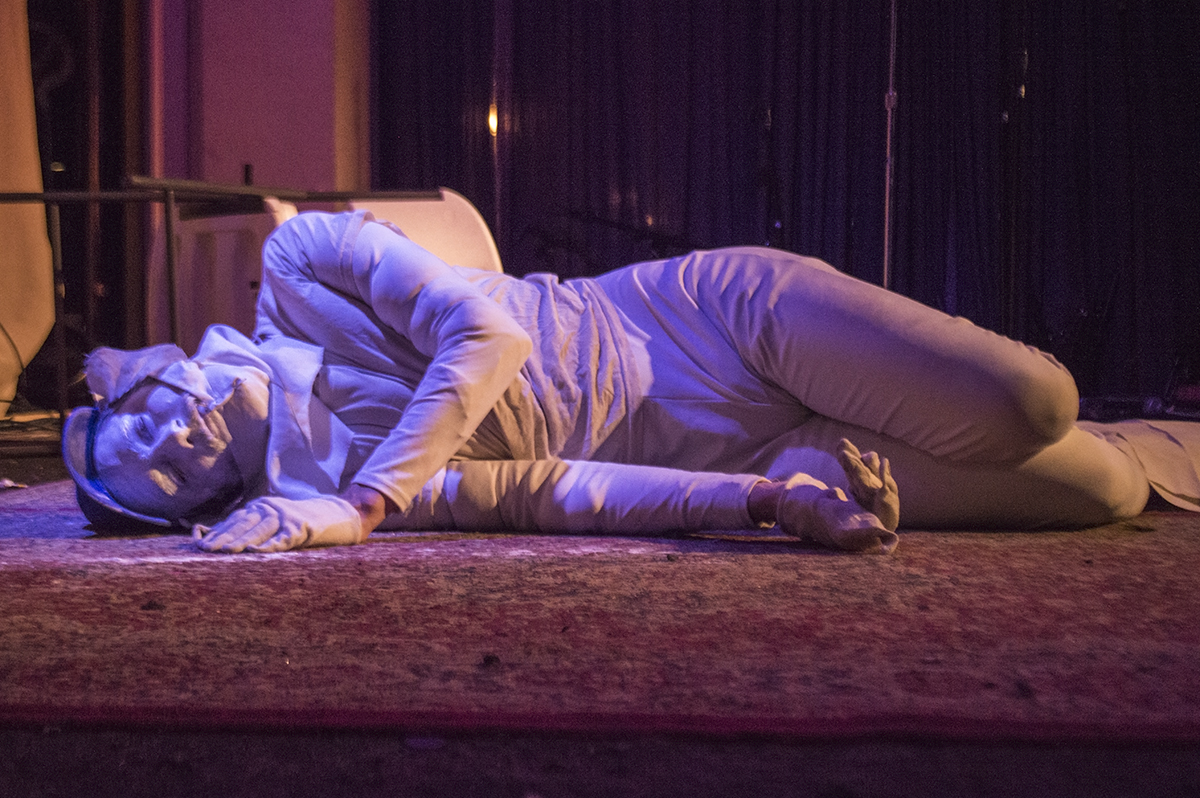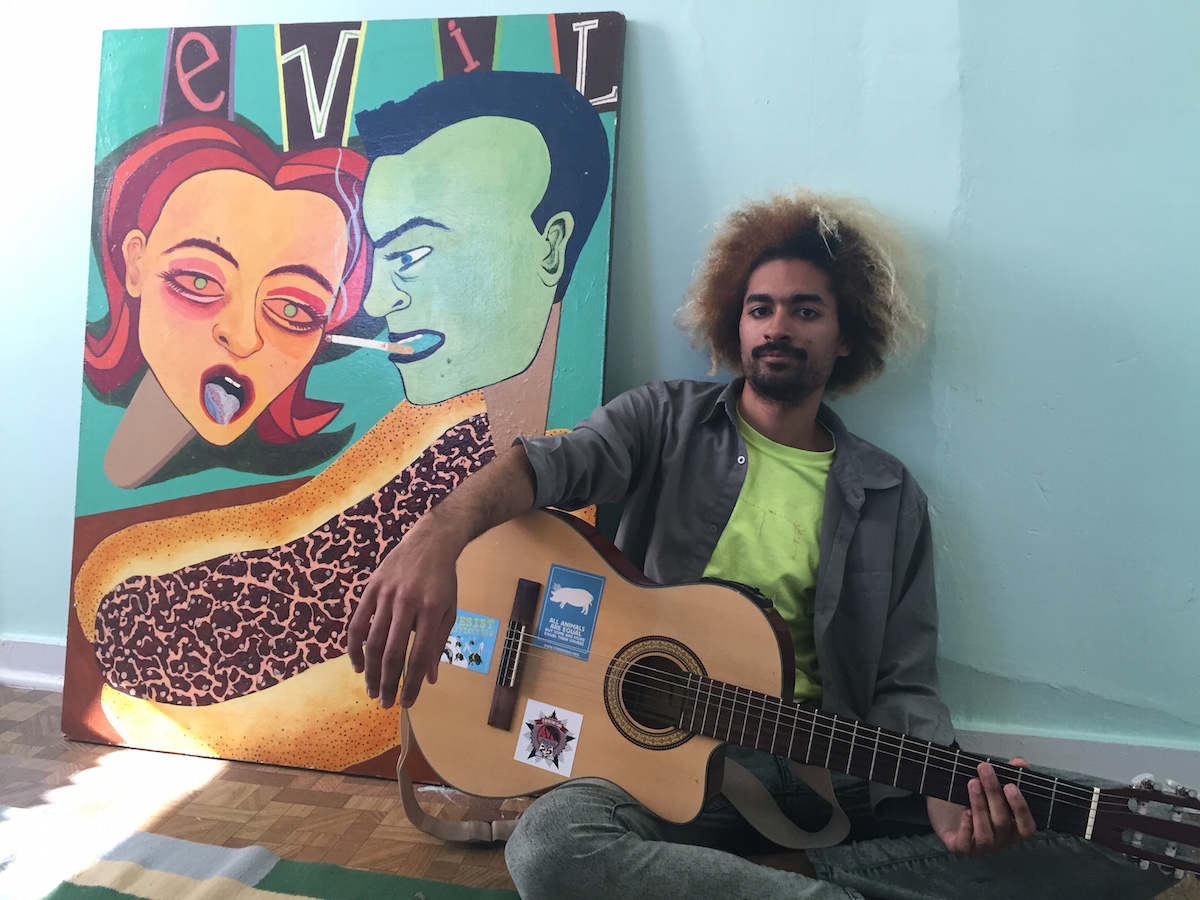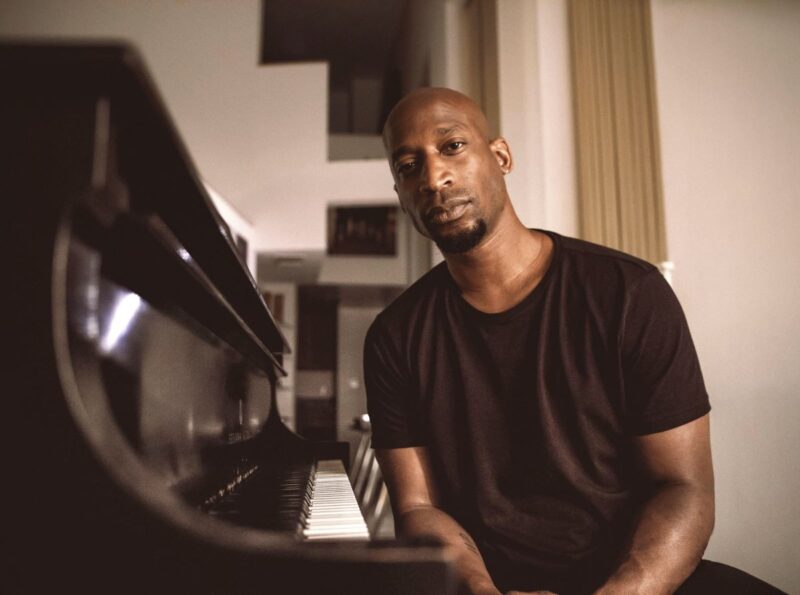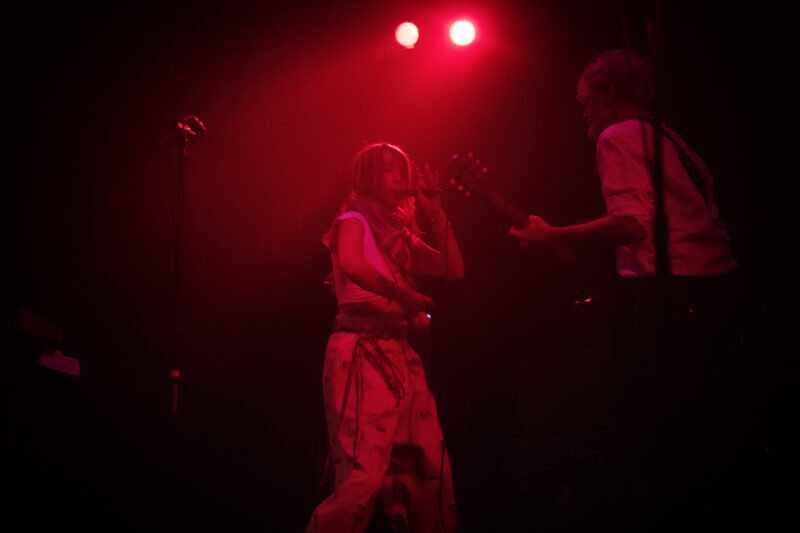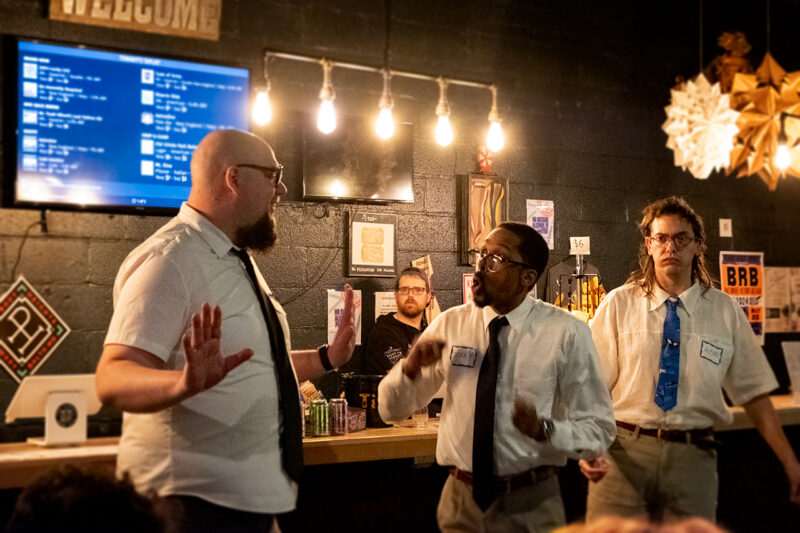A Conversation with Songwriter Baggypantsich by Dan Hanrahan
Baggypantsrich (BPR) is the progenitor of glam folk, a singer-songwriter and lifelong Batimorean who has released five albums of catchy and enigmatic songs. As practiced by the tall and rangy Lauraville resident and DIY tour veteran, glam folk utilizes the angular approach to pop music hooks practiced by glam rockers such as T Rex and David Bowie, but is played most often on unaccompanied acoustic guitar or banjo. Glam folk also offers an attack that veers from the brashness of punk to the plaintive wistfulfulness of pre-folk revival Americana. Crucially, the glam folk of Baggypantsrich retains the insouciance and playful flamboyance of glam rock – characteristics particularly in evidence in BPR’s unpredictable live shows.
I began following Baggypantsrich after seeing him busk at the Waverley Farmers Market in 2014, captivated by his sonorous voice and his puckishly provocative lyrics. In an era when singer-songwriters are often bland, derivative, or purposefully vacuous, BPR is a true iconoclast. His lyrics (e.g. ‘We are young,’ they say every ten or so years * Dream awake/For goodness sake read Finnegan’s Wake) draw from the personal and interpersonal, but are infused with a stark and unique poetic humor. The son of a contemporary classical pianist, BPR’s music continually surprises, as it unspools unexpected and irresistible melodic phrases.
This year he will release his fifth collection of original songs, Palm Reader, his most arresting and varied collection to date. We sat down to tea on a breezy day in April to discuss his songs and performance.
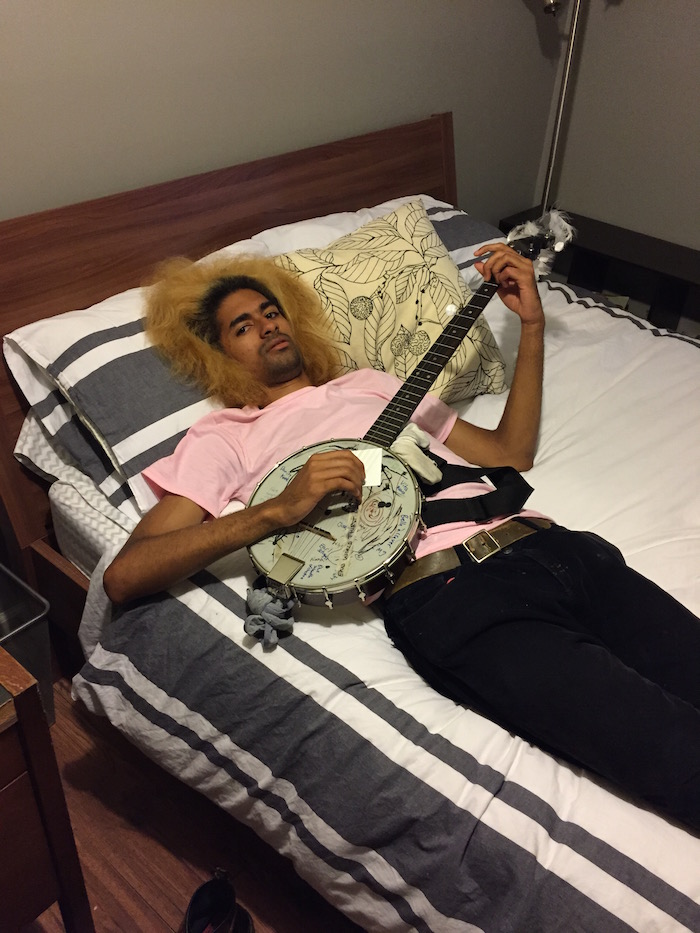
DH: One of the things that most attracts me to your songwriting is that the identity of the protagonists of the the songs– whether the songs are written in the first or in the third person – is not static. Particularly in songs like ”Letter to the Aesthetic Julien” and ”Dana,” the gender, the allegiances, the “race,” the language spoken, and even the moral sense of the protagonists are are all fluid. Can you speak about this aspect of your lyric writing?
BPR: Well, I guess first of all, I can contain multitudes. We all can. When people try to portray things as simply black and white, I don’t really get that. It doesn’t make sense to me because we all have these conflicting interests: it’s never always just one thing. I have never met anyone who is just a flat character; we’re all round.
It’s easy to say, “Well, these are the good guys these are the bad guys.” But even with someone who’s a bad person, it’s always fun to think about their relationship with their mother or a love they had or some little sweet thing about them. I always want there to be some complexity, some drama going on, some type of internal conflict and second-guessing of yourself.
So, that’s one thing. As regards gender, gender is something fascinating to me. I guess I enjoy kind of inhabiting the other one sometimes, trying to feel what that feels like. I guess I really just get a kick out of that; I really enjoy embodying that experience.
You earned B.A. in Creative Writing from the University of Baltimore and you maintain an ongoing interest in the written word and in literature, both in English and in French. How has your study of literature affected your work as a songwriter?
In a general sense, a degree in English is a degree in critical thinking. Studying writing is really studying language: how to structure it, how to organize it, how to construct narratives and cut away the dross and navigate a story. And we tell stories in every aspect of our lives. In critiques, we would read a text and discuss it and try to figure out if the idea within was approached right and executed head-on. And so, I’ve really learned how to carve away and get to the cristaline part of the idea… which is to say that you do not tell a story if it doesn’t matter. There has to be immediacy.

What have you learned from your study of the French Symbolist poets such as Rimbaud?
I’ve always been attracted to the dark side and Rimbaud is really a hedonist and he is… profane. And I definitely love mixing the sacred and profane. (The title of BPR’s 2015 mixtape was ”The Ecstasy of St. Teresa” named for the sculpture by Brancusi. – DH). I like very beautiful Renaissance stuff, but I also like very base, filthy stuff like Jerry Springer. I think they’re both valid because they’re both extreme and they’re both cathartic.
Another aspect of your lyric writing that intrigues is that you have several songs that are evocations of a place– songs such as ”Lauraville,” “Baltimore,” “The Arts District.” and “Dark Room” (about the downtown Baltimore performance space Floristree). Can you shed some light on that aspect of your songwriting?
It’s interesting because when I write about a place, it’s never simply about just that place – but an experience with someone I had at that place. You can write a song about a place, but what makes a city great or a place great is the people that inhabit it. So, Lauraville – it’s my neighborhood, it’s the place I’ve been my whole life – but the song is about this night I had with this girl there. I feel like when I write about a place, it’s never straight, as in, this is what that place is exactly like. It’s always more impressionist – my emotional impressions of a place.
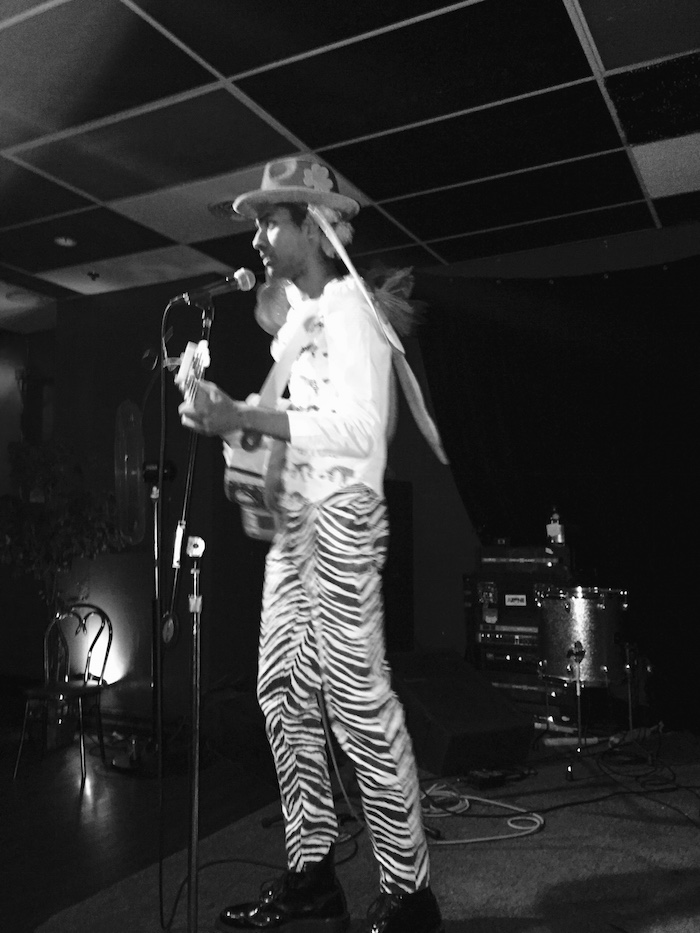
A little over a year ago you did an artistic sojourn/self-designed residency in Paris, as part of an ongoing investigation into your French roots. Could you comment upon your experience in Paris and how it may have affected your work as a musician?
Oh yeah, that whole period of time was kind of trying. I handn’t been working for a little while and I was really trying to just be an artist. I was low on money and living at home and trying to figure out everything and I just knew I should go back to Paris. So, I just bit the bullet and bought a ticket, months in advance. I wanted to rediscover my initial love for the French language and French culture and I wanted to go there and play music and meet people.
I went there in the end of February and it was very gray and cold and that had an effect on me. The first morning I was there – which cast a shadow over the whole experience – I was attacked by someone who wanted some money. So that made me very paranoid and it was intense. But I didn’t let it deter me and I just went out and I played as many open mics as I could; I busked and I went everywhere and I met a lot of people. So, actually being on stage and playing a lot was really fantastic. Anytime I go on a tour or something like that, it’s great to play the same songs a million times.
What happens?
You get comfortable, the songs change. Maybe you’ll forget a lyric, but you create a new one right on the spot or you’ll say, ”Let me speed this one up. Let me do this one in 3/4.” And I did a lot of improvisations and made up random things on the spot if I didn’t feel like singing.
When you have to play because there is an audience, you just sort of go to your– not exactly your “muscle memory”– you go on autopilot and you’re just like, ”I’m just playing. I’m just playing.” I love that. I love when you get to a point where you just keep going and don’t think too much. I think you can do something enough to get to a state where it’s like before you fall asleep, but you’re not asleep – you don’t think; you’re just in the moment of creation.
Song by Baggypantsrich. Video by Dan Hanrahan. Painting by Christine Ferrera.
All photos by Dan Hanrahan including the header image at top with painting in background by Christine Ferrera.
